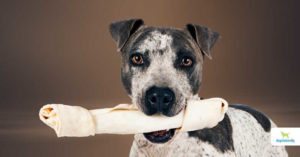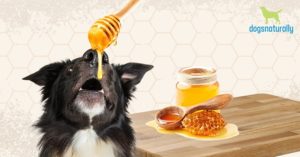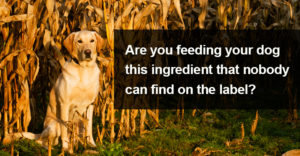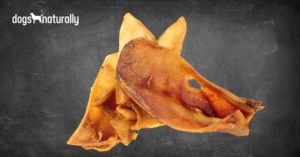Is your dog eating the wrong kind of fat? Many raw-fed dogs get fatty chunks of meat in their bowls … and that means your dog might be eating too much animal fat. Too much animal fat could deprive your dog of other good fats he needs. So, you want to control his animal fat … and instead make sure he gets enough of the healthy fats for dogs.
Why Limit Animal Fats For Your Dog?
Fats are an important source of energy for dogs. Ounce for ounce, fat provides twice as much energy as carbohydrates or protein.
But your dog needs the right kind of fat. Most animal fats are saturated fats. Saturated fat provides the energy your dog needs. It also helps your dog absorb important fat-soluble vitamins … like A, D, E and K. But too much saturated fat can lead to health problems.
This is especially true because most dogs are eating factory farmed animals that are grain-fed. Compared to pasture-raised, grass-fed animals, these meats have some drawbacks. As an example, here are some differences between grass-fed vs factory farmed cattle …
- Grain-fed animals have 2-3 times more saturated fat than grass fed.
- Research shows saturated fat can cause unwanted changes in gut bacteria. These can affect your dog’s immune system and overall health.
- Factory farmed animals are fed antibiotics. So your dog gets them in his food, again harming his gut bacteria.
- Grain-fed beef is more likely to contain harmful bacteria … like E. coli and antibiotic-resistant bacteria.
- Saturated fats promote inflammation. Too much long-term inflammation can lead to chronic disease.
- Saturated fats can lead to behavioral issues … causing inability to focus or remember.
But the worst problem is this. If you feed too much saturated fat, you won’t be able to give your dog enough essential fatty acids. They’re called essential because your dog’s body can’t make them. So he must have them in his diet.
Essential Fatty Acids For Dogs
All the essential fatty acids are polyunsaturated fats. Grain-fed animals have 3-4 times less polyunsaturated fats than grass-fed or wild animals. Essential fatty acids for dogs are …
Omega-6: LA (linoleic acid) and and AA (arachidonic acid)
LA and AA produce hormones that increase inflammation, blood clotting and cell growth. All these things are important for healing. But when inflammation becomes chronic, it leads to long-term disease.
LA is also important for skin and coat, and AA supports the brain.
There are two other omega-6 fatty acids that can benefit your dog’s health.
GLA – gamma linolenic acid
The body can make GLA from LA, but that’s not usually enough. It’s contained in some plant oils. It’s anti-inflammatory, regulates hormones and is good for skin and coat.
CLA – conjugated linoleic acid
CLA is found in grass-fed beef and dairy. CLA may help with weight loss, lower risk of diabetes and cancer.
Omega 3: ALA (alpha-linolenic acid), EPA (eicosapentanoic acid), DHA (docosahexaenoic acid)
Omega-3 fatty acids produce the opposite effect of omega-6s. So they reduce inflammation and support heart, liver and brain health. That’s why you need them to balance the fats in your dog’s diet.
ALA converts to EPA and DHA. EPA is anti-inflammatory and DHA is essential for brain and eye health.
RELATED: How to balance important fats for dogs …
Unbalanced fats can lead to …
- Heart disease
- Weight gain
- Skin and coat issues
- Joint problems, arthritis
- Gut health problems
- Insulin resistance (leading to diabetes)
- Hormone imbalances
- Behavior difficulties
But it’s not enough to just add extra omega-3 fatty acids to your dog’s diet. Because then he’ll be getting too much total fat in his diet.
Total Fat In Your Dog’s Diet
Here are some reasons to limit the amount of fat in your dog’s diet.
- Ideally, your dog’s diet should mimic the ratios of nutrients he’d get in the wild. Most prey animals are about 10% fat and 20% protein. So you want your dog’s diet to contain about 10% fat. Remember that fat has more than twice as many calories per gram (9) as protein (4) or carbohydrates (4). So if your dog gets an equal weight of fat and protein, he’ll be getting twice as many calories from fat as he does from protein.
- Fat is just fat. It doesn’t contain any protein. So if there’s too much fat in your dog’s diet, your dog will be missing other important nutrients.
- You want to add healthy fats containing essential fatty acids. So it’s best to feed your dog very lean meats to leave room to add the omega-6 and omega-3s your dog needs.
PRO TIP
If you’re thinking that 10% fat and 20% protein doesn’t add up to 100% … that’s because the rest is mostly moisture. Don’t make up the difference with carbohydrates. Dogs don’t need carbohydrates like grains or starchy vegetables in their diet. But complex carbohydrates like vegetables and fruit provide extra nutrients for your dog. So make those healthy additions about 5-10% of your dog’s raw diet.
Lower Animal Fats In Your Dog’s Diet
Here are some steps you can take to keep the animal fats in your dog’s diet low:
- Feed lean cuts of meat
- Cut off all visible fat
- When you buy ground meat, look for 90-95% lean meats
- Remove skin from poultry and fish
- Feed wild game when you can get it
Then you’ll be able to add some healthy fats to your dog’s diet without giving him too much total fat.
Sources Of Healthy Fats For Dogs
Here are 5 ways to give your dog healthy fats that’ll help balance his diet.
#1 Green Lipped Mussel Oil
Green lipped mussel oil is rich in important EPA and DHA, like fish oil. But it’s better for your dog than fish oil.
Green lipped mussel oil also contains ETA (eicosatetraenoic acid). ETA is another omega-3 fatty acid with anti-inflammatory effects. Your dog can also convert ETA to EPA. And EPA is known to improve arthritis symptoms, helping to regenerate cartilage.
Green lipped mussels are sustainably farmed in clear New Zealand waters, eating phytoplankton. So the oil is good for the planet and free of contaminants.
RELATED: Why fish oil isn’t the best omega-3 choice for your dog …
#2 Hempseed Oil
Hempseed oil is a powerful plant oil for your dog. It’s a nutritional oil … and it’s not the same thing as CBD oil made from hemp. Hempseed provides an ideal ratio of omega-3, 6 and 9 fatty acids. And it contains GLA, an omega-6 fat with anti-inflammatory effects.
It also contains SDA (stearidonic acid) which is a precursor to EPA.
#3 Ahiflower Oil
Ahiflower oil is a plant seed oil that’s super-healthy for your dog. It contains the essential omega-6 fatty acid, GLA … 60% more than hempseed oil. It also provides SDA (stearidonic acid), which helps the body produce ETA and EPA.
#4 Pasture Raised Eggs
Egg yolks are a great source of healthy omega-3 fats for your dog … as long as they’re from hens that live outdoors. But eggs also provide protein and a wide range of other nutrients, especially if you feed the whole egg.
When you shop for eggs, be careful with labeling. You want to look for pasture-raised eggs … meaning they truly live outdoors. Some eggs are labeled free-range, but it’s a misleading term that doesn’t mean the hens go outside. Pastured eggs have a much higher amount of omega-3 fats than conventional eggs.
Buy organic eggs from a local farm or farmer’s market if you can. Grocery store eggs, even if correctly labeled, are often washed with chemicals. If you buy your eggs from a farmer, you can feed your dog the shells. They provide extra calcium. And the membrane inside the shell is shown to improve arthritis symptoms.
If you can’t find organic, pasture-raised eggs, the next best thing is to get omega-3 enriched ones. Those hens were usually fed flax seeds or another omega-3 source. Omega-3 eggs have 5 times more omega-3 than conventional eggs.
RELATED: Learn what raw eggs can do for your dog …
#5 Grass-Fed Ghee
Ghee is a clarified butter that’s used a lot in Indian food. It’s made by boiling butter to remove all the milk solids. So ghee has no lactose or casein that your dog could be sensitive to. Because of that, the fat is also more concentrated.
Ghee is a saturated fat … but it’s a good fat to give your dog as a source of conjugated linoleic acid (CLA). Studies show CLA can help with weight loss and may prevent diabetes and cancer. Be sure to choose grass-fed ghee for a higher level of CLA. CLA is also in grass fed butter, but it’s better to avoid the dairy in whole butter.
Ghee also contains the short-chain fatty acid, butyrate, which is good for gut health.
Feed your dog leaner meats so you can add some of these healthy fats to balance his diet. It’s a good idea to rotate fat sources to give your dog a wider range of benefits.
References
Bilotta AJ, Cong Y. Gut microbiota metabolite regulation of host defenses at mucosal surfaces: implication in precision medicine. Precis Clin Med. 2019 Jun;2(2):110-119.
Wan Y et al. Effects of dietary fat on gut microbiota and faecal metabolites, and their relationship with cardiometabolic risk factors: a 6-month randomised controlled-feeding trial. Gut. 2019 Aug;68(8):1417-1429.
Wan Y et al. Contribution of diet to gut microbiota and related host cardiometabolic health: diet-gut interaction in human health. Gut Microbes. 2020 May 3;11(3):603-609.
Pilla R, Suchodolski JS. The Role of the Canine Gut Microbiome and Metabolome in Health and Gastrointestinal Disease. Front Vet Sci. 2020 Jan 14;6:498.
Sofia Schauf et al. Effect of dietary fat to starch content on fecal microbiota composition and activity in dogs, Journal of Animal Science, Volume 96, Issue 9, September 2018, Pages 3684–3698,
Daley CA et al. A review of fatty acid profiles and antioxidant content in grass-fed and grain-fed beef. Nutr J. 2010;9:10. Published 2010 Mar 10.
Kapoor R, Huang YS. Gamma linolenic acid: an antiinflammatory omega-6 fatty acid. Curr Pharm Biotechnol. 2006 Dec;7(6):531-4.
Whitehouse MWet al. Anti-inflammatory activity of a lipid fraction (lyprinol) from the NZ green-lipped mussel. Inflammopharmacology. 1997;5(3):237-46.
Gaullier JM et al. Conjugated linoleic acid supplementation for 1 y reduces body fat mass in healthy overweight humans. Am J Clin Nutr. 2004 Jun;79(6):1118-25.
Lee KW, Lee HJ, Cho HY, Kim YJ. Role of the conjugated linoleic acid in the prevention of cancer. Crit Rev Food Sci Nutr. 2005;45(2):135-44.
Cushing K et al. Butyrate and Mucosal Inflammation: New Scientific Evidence Supports Clinical Observation. Clin Transl Gastroenterol. 2015;6(8):e108. Published 2015 Aug 27.












